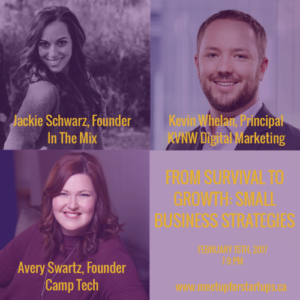Creating and running an event can be an insane amount of work but the planning is only half the job. The biggest and most stressful part is the promotion. Getting the seats filled or tickets sold will make or break the event so a certain priority needs to be placed on this piece.
It’s not difficult to promote an event, but it does take perseverance and multiple channels of attack (it’s a bit time consuming). And if you’re working without a network it can be a little scary too. Here are seven easy ways to start promoting your next event:
Blog posts
Putting searchable content on the web around the event topic can be an effective way to generate buzz. Blog posts can be of varying lengths and if done well in advance they can also build an email list of those interested in learning more. Make sure you write posts that are connected to the event theme or topic and promote the event at the bottom or through a link within the copy.
Guest posts can work as well or reaching out to bloggers that are willing to mention the event in exchange for a free pass – or just for professional interest.
Directory listings
Event directories work well simply because they cover the bases. Choose a wide variety of listings if they are available such as by industry or by location. Don’t confuse directories with ticketing sites like Eventbrite or Meetup.com – both are excellent sites to use but they are not strictly a directory (they don’t post events outside those that are hosted on their platform).
Social Media
An obvious one is to create engaging posts and share them across your social channels. Always include a branded image and test out multiple forms of copy to find out what draws clicks. Ask your network to share too. Reaching out strategically to network influencers for their support can really pay off as well.
Paid ads on social media can be cheaper than other ads and many sites will let you pay to ‘boost’ your post which is cheaper than running an ad.
Building an email list pays off here. If you don’t have a lit you might be able to partner with an organization that has a list and offer their list members a discount – so it suddenly becomes an exclusive offer.
Physical
Using direct mail, flyers or posters can work depending on the type of event. Mail drops are great if you’re targeting is based on location (and not role or industry). If you already have a mailing list (you can buy one), you can send a postcard. And putting up posters in areas where your target market go has been known to work well for community type events. You can even have a sandwich board or people handing out flyers.
Unique Content
This is a bit of an extension to writing blog posts, but creating different types of content to highlight different aspects of your event can work well in building buzz and clicks. Infographics that are easy to share with lots of visuals can really help spread the word. Other content to create could be a quiz around attendee personality, a fun survey where results are revealed at the event, photo challenge, etc.
Paid Ads
Whether online or in print, advertising does work. The variables can be overwhelming if you’re doing this by yourself but there’s more to the ad world than Google Adwords. Association websites usually offer decent rates for advertisers and can often offer unique ways to get in front of their members. Industry publications work well for print ads. The key here is to really know who you’re targeting and how much you’re willing to spend. Make sure your creative is spot on too – it can be expensive to change.
The above seven ways are the tip of the iceberg in promotion. Which promotion tactic you choose is heavily dependent on the type of event you’re promoting and who your target audience is. For example, an evening gala for CEOs might not be enticed to spend a high ticket price if you’re handing out flyers on the corner (and that’s not really targeted – it’s more of a spray and pray tactic). I’ll leave you with these two final tips:
TRACK EVERYTHING: It’s important to track where your attendees come from so create different discount codes for each channel you promote through. This information will help guide where to spend more money next time.
PLAN IN ADVANCE: Plan your promotion far in advance. Have your creative and content ready to go with channel strategies, dates, times, etc. Ads are usually placed well in advance. And don’t promote until you can either sell tickets or collect names.
And in keeping with this post – here is the next event we are participating in. It’s specifically designed for those small businesses or entrepreneurs who are on the cusp of growth but are unsure how to proceed. If that’s you – join us on Feb 15th in Toronto!



